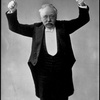
Max Fiedler Sheet Music
- Born: 31st December 1859
- Died: 1st December 1939
- Birthplace: Zittau, Saxony, Germany
Max Fiedler was a German conductor and composer, born August Max Fiedler. He was especially noted as an interpreter of Brahms. He first studied the piano with his father, who conducted the accompanying orchestra when Max made his first public appearance at the age of ten in 1870, playingMozart's Piano Concerto in A, K.488. Continuing his musical studies in Zittau with the organist Gustav Albrecht, who had been a pupil of Mendelssohn, Fiedler then entered the Leipzig Conservatory in 1877, where the director, Carl Reinecke, was his piano teacher. He graduated in 1882, with exceptional honours, alongside his friend and colleague Karl Muck. Fiedler also studied composition and was active in the city's musical life, developing a close relationship with Julius Spengel, a friend of Brahms. Fiedler made several commercial recordings, all of music by Brahms, apart from two overtures by Weber. He recorded the Academic Festival Overture, Symphony No. 2, two movements from the Piano Concerto No. 2 and the Symphony No. 4 with the Berlin Philharmonic Orchestra. In addition a number of his later radio performances have been preserved: these include accounts of Brahms' Violin Concerto and Schumann's Symphony No. 1 from Berlin. Because of his contemporary stature as an interpreter of Brahms and his direct contact with the composer, it is easy to consider Fiedler's performances of Brahms as being in some way 'authentic'. However the English writer Christopher Dyment has written that, while Fielder was a conductor who ‘... most fully explored every facet of Brahms’s emotional world’, nevertheless his performances, because of their constant shifts of tempo and mannered phrasing—for instance the frequent introduction of unwritten luftpausen—reflected an interpretative model that owed far more to von Bülow than to Brahms. Dyment concluded that in Fiedler's recording of the Symphony No. 4, for instance, ‘…Brahms’s demands for flexibility are here supplied in over-abundance.’ On the other hand, it is known that Brahms conducted his music with occasional unwritten tempo changes. Nonetheless, even if Fiedler's recordings do represent a highly individualised interpretative approach, they still allow a fascinating glimpse into a world of musical performance only imperfectly chronicled, for historical reasons, by the gramophone. Fiedler's own compositions include a symphony, overture, piano quintet, string quartet, and piano pieces and songs.